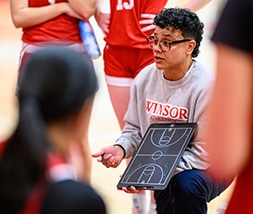Curriculum Guide
Mathematics
All Upper School students are required to take three years of mathematics in Class V through Class VII, and students are strongly encouraged to take math through Class VIII. All mathematics courses are major courses. All mathematics courses taken during the fall semester of senior year satisfy the quantitative requirement.
The goal of the Winsor mathematics program is to teach for understanding and mastery, and these goals are best reached through regular practice, feedback, and ongoing collaborative problem solving with peers. The program’s design enables all students to study calculus while at Winsor. Use of the TI-84 graphing calculators is an essential part of all Upper School math courses. Some incoming or current Upper School students who have developed advanced skills might feel that they have already mastered the material in a course in the traditional math sequence; these students should speak with their teacher or the head of the Mathematics Department. In the rare instance that acceleration is considered a possibility, the student will need to demonstrate on a Winsor assessment a mastery of the material of the course they will skip.
The Upper School offers the following courses: Algebra 2, Geometry, Precalculus, Calculus, Statistics, and Post-Calculus Mathematics. Algebra 2, Geometry, and Precalculus are also offered at the advanced and honors levels. Calculus is also available at the Advanced Placement (AP) AB and BC levels. AP Statistics is also offered. Students who have successfully completed either AB or BC calculus may enroll in Topics in Post-Calculus Mathematics or AP Statistics.
The department places students into sections that are based on the pace and depth of topics that are studied, while trying to balance the best interests of each individual student. For its decisions, the department uses input from a student’s current and past teachers, including both grades and the teacher’s sense of a student’s comfort with a particular pace. The advanced-level courses study the topics in more depth and investigate problems of greater complexity and challenge, with limited review of prerequisite courses’ material. The honors level requires mastery of prerequisite courses’ material. In addition to studying the topics in more depth and with greater complexity and challenge, the fast pace of this level may allow for additional topics to be explored.
Algebra 2 (1 credit)
All students will study the core topics of Algebra 2: quadratic equations and functions, and polynomial equations and functions. Complex numbers, systems of equations, inverse functions, transformations and rational expressions will also be studied. The algebraic and graphical aspects of each topic will be emphasized. The applications of the TI-84 graphing calculator will be introduced. This course is open to students who have completed a full year of Algebra 1 at Winsor, or by department permission.
Geometry (1 credit)
This yearlong course introduces and reinforces the principles of mathematical logic by emphasizing rigorous geometric proofs at all levels; proof work is extensive at the advanced and honors level. Students will study the formal definitions, postulates, and theorems concerning parallel and perpendicular lines, congruent triangles, quadrilaterals, polygons, and circles. In addition to using these theorems in their proof-work, students will apply them to problems concerning right triangle trigonometry, similar figures, areas, and volumes. Additional topics such as symmetry, coordinate geometry, probability, constructions, and transformations will be included as time permits. This course is open to students who have completed a full year of Algebra 2 at Winsor, or by department permission.
Precalculus (1 credit)
In this course, students continue to study functions, including polynomial, rational, exponential, logarithmic, and trigonometric, in addition to their applications. Graphing calculators are used throughout the course to build understanding and help solve problems. Analytic and algebraic problem-solving methods are also emphasized so that students will understand multiple approaches and techniques. Other topics covered include transformations of graphs, inverses of functions, solving equations and inequalities, trigonometric identities, and the laws of sines and cosines. In addition, polar coordinates, sequences and series, limits, and introductory calculus concepts are introduced, if time permits. This course is open to students who have completed Geometry at Winsor, or by department permission.
Calculus (1 credit)
Calculus is a yearlong course where students study the concepts of both derivatives and integrals. Emphasis will be placed on graphical interpretation of limits, slopes, and area in addition to computational accuracy. Applications of calculus (e.g., optimization, related rates, areas, and volumes) will be presented and examined. The course will begin studying these topics with polynomial functions although other functions may be included should time allow. Throughout the course, a graphing calculator is used as a tool to enhance understanding of the concepts and facilitate problem-solving. This course is open to students who have completed Precalculus at Winsor or by department permission.
AP Calculus (1 credit)
AB and BC Calculus are both Advanced Placement courses open to students by permission of the department. Beginning with the concepts of limits and continuity, students go on to learn about derivatives and their applications and then progress to the theory, techniques, and applications of integration. Throughout the course, graphing calculators are used as a tool to enhance understanding of the concepts and to facilitate problem-solving. Additional topics are included as prescribed by the AP syllabus for each course. BC Calculus includes the study of logistic growth, improper integrals and convergent infinite series. These courses prepare students to take either the AB or BC Calculus Exam. Prerequisite: Precalculus. Enrollment is by permission of the department.
Statistics & Data Analysis (0.5 credits, fall)
First semester topics come from all four themes mentioned above: exploring data, sampling and experimentation, anticipating patterns, and statistical inference. While understanding formulas is important, memorizing formulas is kept to a minimum. The TI-84 graphing calculator will be used regularly to facilitate computation and to display data. This course is open to Class VII and VIII students. Prerequisite or corequisite: Precalculus. This course meets at the same time as AP Statistics.
AP Statistics (1 credit)
This yearlong course introduces students to the major concepts and tools for collecting, analyzing, and drawing conclusions from data. Topics fall into four themes: exploring data (describing patterns and departures from patterns); sampling and experimentation (planning and conducting a study); anticipating patterns (exploring random phenomena using probability and simulation); and statistical inference (estimating population parameters and testing hypotheses). While understanding formulas is important, memorizing formulas is kept to a minimum. The TI-84 graphing calculator will be used regularly to facilitate computation and to display data. The emphasis of the course is on understanding and communicating with statistical concepts and language. This course prepares students to take the AP Statistics Exam. This course is open to Class VII and VIII students. Prerequisite or corequisite: Precalculus. This course meets at the same time as Statistics & Data Analysis.
Topics in Post-Calculus Mathematics (1 credit)
Students will be introduced both to the rigors of higher mathematics beyond calculus and to some of the intriguing mathematical concepts that have been developed over the past 2000 years. Particular attention will be paid to the formality of mathematical notation and writing. Topics to be investigated may include—but are not limited to—formal logic, set theory, proof techniques, number theory, non-Euclidean geometry, group theory, and dynamics. Prerequisite: AB or BC Calculus. Enrollment is by permission of the department.





